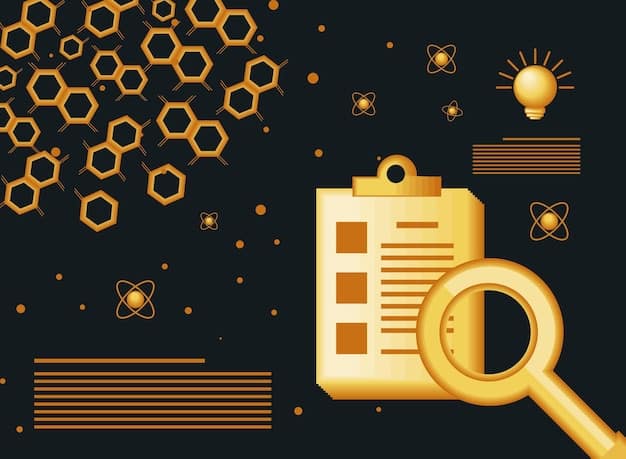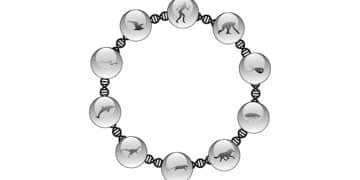Decoding Biotech Patent Law Changes: A US Investor’s Guide

Decoding Biotech Patent Law Changes: A US Investor’s Guide to Protecting Your Assets explores the complexities of biotech patent law for US investors, offering insights into safeguarding investments and navigating the legal landscape.
Navigating the world of biotech investing requires more than just a keen eye for innovation; it demands a solid understanding of intellectual property law. Decoding Biotech Patent Law Changes: A US Investor’s Guide to Protecting Your Assets becomes essential reading, offering insights into how recent legal shifts impact investment strategies.
Understanding the Fundamentals of Biotech Patents
Biotech patents are at the heart of innovation in the life sciences. These patents protect novel biological processes, products, and technologies, granting inventors exclusive rights for a specified period. Understanding these patents is crucial for investors looking to capitalize on groundbreaking developments in biotech.
The value of a biotech company often hinges on the strength and breadth of its patent portfolio. A robust patent position can provide a significant competitive advantage, attracting further investment and driving market share. Conversely, weaknesses in patent protection can expose a company to potential challenges and reduce its overall valuation.
What Can Be Patented in Biotech?
In the realm of biotechnology, patentability extends to a wide range of innovations. However, it’s important to understand what qualifies for patent protection under US law.
- Novel Genes and Proteins: Discoveries of new gene sequences or proteins with specific functions can be patented.
- Diagnostic Methods: Innovative methods for diagnosing diseases or conditions using biological markers are eligible for patent protection.
- Therapeutic Antibodies: The development of antibodies with therapeutic applications can be protected through patents.
- Cellular Therapies: New methods for modifying or using cells for therapeutic purposes are patentable subject matter.
These are just a few examples of what can be patented in the biotech sector. Understanding the scope of patentable subject matter is crucial for both inventors and investors seeking to protect their intellectual property or assess the value of a biotech company.
In essence, biotech patents form the bedrock of innovation in the industry. They incentivize research and development by providing a period of exclusivity, allowing companies to recoup their investments and continue pushing the boundaries of scientific discovery.

Key Changes in US Patent Law Affecting Biotech
Recent changes in US patent law have introduced new complexities for biotech companies and investors. These changes impact everything from patent eligibility to the scope of patent protection, and it’s essential to stay informed to make sound investment decisions.
The Supreme Court’s decisions in cases like Mayo Collaborative Services v. Prometheus Laboratories, Inc. and Association for Molecular Pathology v. Myriad Genetics, Inc. have significantly narrowed the scope of patentable subject matter in the biotech field. These rulings have raised questions about the patentability of diagnostic methods and naturally occurring gene sequences.
Impact of Supreme Court Rulings
The Supreme Court’s decisions have had a profound impact on the biotech industry, particularly in the areas of personalized medicine and genetic testing. Here’s a closer look at the key implications:
- Diagnostic Method Patents: The Mayo v. Prometheus decision raised the bar for patenting diagnostic methods, requiring that the claims involve more than just observing a natural correlation.
- Gene Patents: The Myriad Genetics case invalidated patents on isolated gene sequences, ruling that merely discovering and isolating a gene is not enough to warrant patent protection.
- Impact on Investment: These rulings have created uncertainty in the biotech sector, potentially impacting investment decisions and strategies.
The legal landscape surrounding biotech patents continues to evolve, with ongoing debates about the appropriate balance between incentivizing innovation and promoting access to scientific discoveries. Investors need to be aware of these developments and their potential impact on the value of biotech companies.
In conclusion, understanding the key changes in US patent law is essential for any investor involved in the biotech sector. These changes have reshaped the landscape of patent eligibility and enforcement, requiring a more nuanced approach to assessing the value and potential risks of biotech investments.
Strategies for Protecting Biotech Investments in the Current Legal Climate
Given the shifting legal landscape, US investors need to adopt proactive strategies to protect their biotech investments. These strategies should focus on identifying companies with robust patent portfolios, diversifying investments, and conducting thorough due diligence.
One of the most effective ways to mitigate risk is to invest in companies with strong patent positions that go beyond simply claiming naturally occurring phenomena. Look for companies that have developed innovative applications, methods, or compositions of matter that are more likely to withstand legal scrutiny.

Due Diligence is Crucial
Before investing in a biotech company, it’s vital to conduct thorough due diligence to assess the strength and validity of its patent portfolio. This should include:
- Patent Claim Analysis: Evaluate the scope and validity of the company’s key patent claims, taking into account recent court decisions and legal precedent.
- Freedom-to-Operate Analysis: Determine whether the company’s products or technologies infringe on any existing patents held by third parties.
- Risk Assessment: Identify potential legal challenges or vulnerabilities that could impact the company’s patent position.
- Expert Consultation: Seeking advice from patent attorneys or legal experts with experience in the biotech sector can provide valuable insights and guidance.
These steps can help investors make more informed decisions and avoid potential pitfalls associated with investing in companies with weak or vulnerable patent portfolios.
By focusing on companies with strong patent positions, conducting thorough due diligence, and diversifying investments, US investors can navigate the complex legal landscape of biotech patent law and protect their assets in the face of ongoing change.
The Role of Patent Attorneys and Legal Experts
Patent attorneys and legal experts play a crucial role in helping biotech companies and investors navigate the complexities of patent law. These professionals can provide invaluable assistance in drafting patent applications, conducting patent searches, and defending against infringement claims.
A skilled patent attorney can help a biotech company craft a strong and enforceable patent application that accurately reflects the scope of the invention and complies with all legal requirements. They can also advise on patent strategy, helping companies prioritize which inventions to patent and where to seek patent protection.
How Legal Experts Can Help
Legal experts with specialized knowledge of biotech patent law can provide a range of services, including:
- Patent Prosecution: Guiding companies through the process of obtaining patents from the US Patent and Trademark Office (USPTO).
- Patent Litigation: Representing companies in patent infringement lawsuits, either as plaintiffs or defendants.
- Due Diligence: Conducting patent due diligence investigations for investors or companies considering mergers or acquisitions.
- Licensing Agreements: Negotiating and drafting licensing agreements for patented technologies.
Patent attorneys and legal experts are essential partners for biotech companies and investors seeking to protect their intellectual property and navigate the legal challenges of the industry.
In sum, the expertise of patent attorneys and legal professionals is invaluable for protecting biotech investments and maximizing the value of intellectual property assets.
Future Trends in Biotech Patent Law
The field of biotech patent law is constantly evolving, driven by technological advancements and shifts in legal interpretation. Understanding these future trends is crucial for US investors seeking to stay ahead of the curve and make informed investment decisions.
One of the key trends to watch is the ongoing debate about the patentability of artificial intelligence (AI) and machine learning (ML) technologies in biotech. As AI and ML become increasingly integrated into drug discovery, diagnostics, and other areas of biotech, the question of how to protect these innovations will become more pressing.
Emerging Technologies and Patent Law
Several emerging technologies are poised to reshape the landscape of biotech patent law in the coming years:
- CRISPR Gene Editing: The groundbreaking CRISPR gene editing technology has raised complex patent issues related to ownership and scope of patent protection.
- Personalized Medicine: The development of personalized medicine approaches, tailored to individual patients based on their genetic makeup, presents challenges for patenting diagnostic and therapeutic methods.
- Biologics and Biosimilars: The market for biologic drugs and their biosimilar counterparts is growing rapidly, leading to increased patent litigation and regulatory scrutiny.
These technologies are pushing the boundaries of what is considered patentable subject matter and raising difficult questions about the balance between incentivizing innovation and promoting access to healthcare.
Keeping abreast of these future trends will be essential for US investors looking to navigate the complex and dynamic world of biotech patent law and protect their investments in the years to come.
Case Studies: Biotech Patent Disputes and Their Impact on Investors
Examining real-world case studies of biotech patent disputes can provide valuable insights into the potential impact of patent litigation on investors. These cases highlight the risks and rewards associated with investing in companies with strong or weak patent portfolios.
One notable example is the long-running patent dispute between the University of California, Berkeley, and the Broad Institute of MIT and Harvard over the CRISPR gene editing technology. This dispute has involved complex legal arguments and significant financial stakes, with implications for the licensing and commercialization of CRISPR-based therapies.
| Key Aspect | Brief Description |
|---|---|
| 🧬 Patent Fundamentals | Understanding basics like eligible subject matter and claim scope. |
| ⚖️ Legal Changes | Stay informed of US patent law shifts impacting biotech. |
| 🛡️ Investment Strategies | Invest in companies with strong patent positions. |
| 🧑⚖️ Legal Experts | Consult with patent attorneys for due diligence. |
FAQ
▼
A biotech patent protects novel biological processes, products, or technologies. It grants the inventor exclusive rights for a set period, typically 20 years from the filing date.
▼
Patents can be a key asset for biotech companies. A strong patent portfolio gives a company a competitive advantage, attracting investors and potentially increasing market value.
▼
Supreme Court rulings have narrowed the scope of patentable subject matter in biotech, raising questions about the patentability of diagnostic methods and some gene sequences.
▼
Invest in companies that have robust patent portfolios. Conduct thorough due diligence and analyze patent claims before investing in a biotech company.
▼
Keep an eye on the patentability of AI & machine learning in biotech, CRISPR gene editing, and the impact of personalized medicine and biologics/biosimilars.
Conclusion
In conclusion, successfully navigating the complexities of biotech patent law requires US investors to stay informed about the latest legal changes, adopt proactive protection strategies, and seek guidance from experienced legal professionals. By understanding the fundamentals of biotech patents and emerging trends in the field, investors can make more informed decisions and protect their assets in this dynamic and innovative sector.





